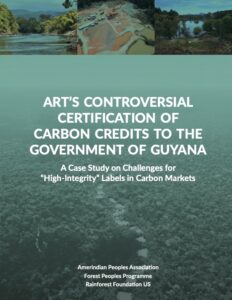The report “ART’s Controversial Certification of Carbon Credits to the Government of Guyana: A Case Study on Challenges for ‘High-Integrity’ Labels in Carbon Markets” critiques the pivotal developments in Guyana’s participation in the carbon market under the Architecture for REDD+ Transactions (ART), specifically concerning the social integrity of carbon credit certification. By examining the details of this case, the report casts a spotlight on the significant challenges that arise in ensuring the integrity and ethical standing of carbon credits, as it pertains to ensuring the rights of Indigenous peoples in forest carbon program design, implementation, and monitoring.
Based on detailed analysis of the concerns raised by Indigenous peoples over the course of development of the REDD+ program in Guyana, the report provides recommendations for a more inclusive and rights-based approach to carbon market participation. It underscores the importance of improving the design and implementation of the standard to foster sustainable development, environmental integrity, and social justice in Guyana.
By highlighting key rights issues in Guyana, the case study aims to make a critical contribution to improving carbon market integrity on a broader scale.
Collaboratively authored by the Amerindian Peoples Association, Forest Peoples Programme, and Rainforest Foundation US.




